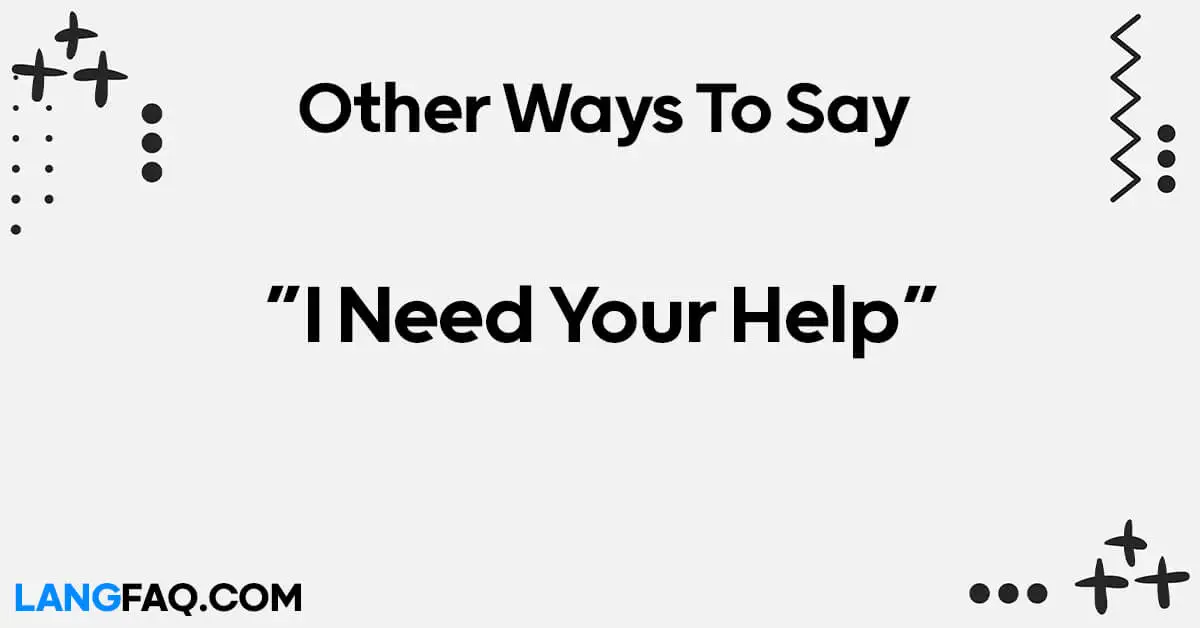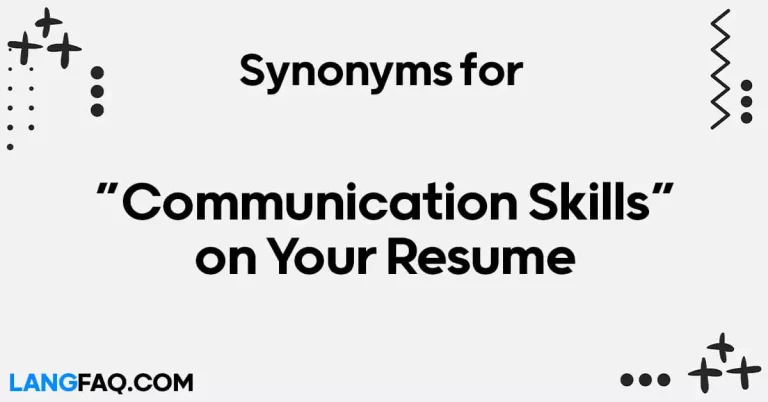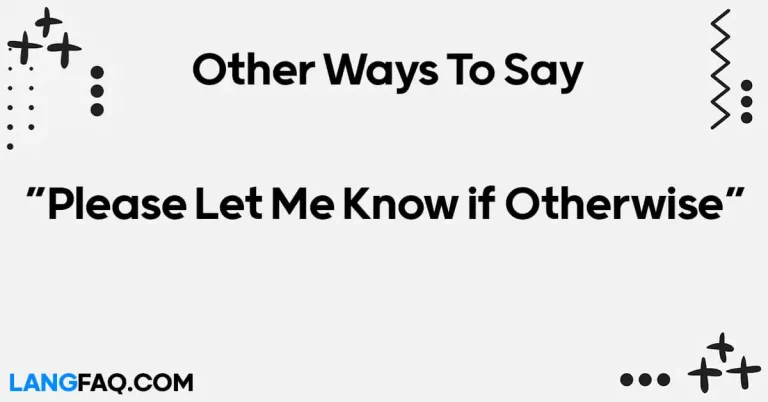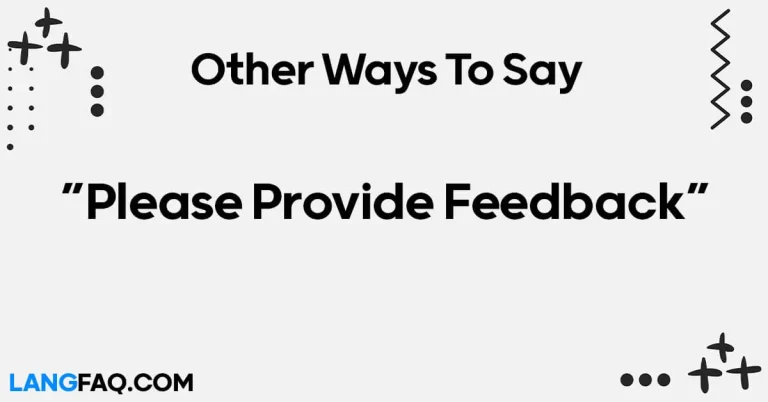In our daily lives, effective communication plays a pivotal role. When it comes to seeking help, expressing it in diverse ways can enhance both understanding and connection. This guide unveils 12 alternative phrases to articulate the sentiment of needing assistance, empowering you with a richer vocabulary for various situations.
12 Other Ways to Say “I Need Your Help”
Here are 12 alternative ways to express the sentiment “I need your help”:
- Require Your Assistance
- Could Use a Hand
- Seeking Support
- In Need of Your Expertise
- Asking for a Favor
- Could You Lend a Hand?
- Support Needed
- Facing a Challenge
- Assistance Appreciated
- Could Do with Some Help
- In a Bit of a Pickle
- Could Really Use Your Support
Here’s a table with the meanings and examples of the 12 alternative ways to express “I need your help”:
| Expression | Meaning | Example |
|---|---|---|
| Require Your Assistance | Formal request for help. | “I require your assistance in completing this task.” |
| Could Use a Hand | Casual appeal for assistance. | “I’m stuck with this project; could use a hand?” |
| Seeking Support | Looking for help or guidance. | “I’m seeking support to navigate through this issue.” |
| In Need of Your Expertise | Requesting help from someone skilled. | “I’m in need of your expertise for this specific task.” |
| Asking for a Favor | Seeking help with a sense of trust. | “I’m asking for a favor; can you assist me, please?” |
| Could You Lend a Hand? | Friendly request for assistance. | “Could you lend a hand with moving these boxes?” |
| Support Needed | Directly stating the need for support. | “Support is needed to address this matter.” |
| Facing a Challenge | Acknowledging a difficulty and seeking help. | “I’m facing a challenge and could use some assistance.” |
| Assistance Appreciated | Expressing gratitude in advance for help. | “Your assistance is appreciated; thank you in advance.” |
| Could Do with Some Help | Informal way of asking for assistance. | “Could do with some help figuring out this problem.” |
| In a Bit of a Pickle | Adding humor to a request for help. | “I’m in a bit of a pickle; mind helping me out?” |
| Could Really Use Your Support | A heartfelt appeal for assistance. | “I could really use your support during this time.” |
In diverse situations, there are numerous ways to articulate the need for assistance, each carrying its own tone and nuance. Whether it’s a formal request or a casual appeal, having a rich vocabulary for seeking help enhances communication and fosters better understanding.
Is It Correct to Say “I Need Your Help”?
Certainly! “I need your help” is a grammatically correct and commonly used expression in English. It is a straightforward and polite way to convey that you require assistance or support from someone. This phrase is suitable for various situations, both formal and informal, making it versatile in everyday communication.
Contexts Where “I Need Your Help” is Appropriate:
- Professional Settings:
- Example: “In completing this report, I need your help in analyzing the data.”
- Personal Relationships:
- Example: “Planning the surprise party is a bit overwhelming; I need your help with the arrangements.”
- Academic Environments:
- Example: “Understanding this concept is challenging; I need your help in clarifying it.”
- Team Collaborations:
- Example: “To meet the project deadline, I need your help in coordinating tasks.”
Dictionary Insight:
The phrase “I need your help” is straightforward and falls within the common usage of the word “need,” indicating a requirement or necessity for assistance.
Grammar/Usage Rules:
- Direct Request: The phrase is a direct and clear request, making it effective in various situations.
- Politeness: It maintains a polite tone while expressing urgency or dependence on someone’s assistance.
- Versatility: It can be adapted for both formal and informal communication.
Tips for Usage:
- Clarity: Specify the nature of the help you require to provide clarity to the person you are asking.
- Express Gratitude: Follow up the request with a thank-you to show appreciation for their willingness to help.
Professional Mail Example With “I Need Your Help”
Subject: Assistance Needed for Project Analysis
Dear [Recipient’s Name],
I trust this email finds you well. I am reaching out to you because we are currently in the final stages of analyzing the data for our upcoming project, and I need your help in ensuring the accuracy and thoroughness of our findings.
Given your expertise in data analysis and your previous contributions to similar projects, I believe your insights will be invaluable in uncovering any potential areas of improvement. Specifically, I am seeking your assistance in reviewing the statistical models we’ve applied and providing feedback on their appropriateness for our project goals.
If you could spare some time this week for a brief meeting to go over the details, I would greatly appreciate it. Your support is crucial to the success of this analysis, and I am confident that with your input, we can enhance the quality of our final report.
Please let me know a time that suits you, and I will arrange the meeting accordingly. Your willingness to assist is genuinely appreciated, and I look forward to collaborating with you on this important aspect of our project.
Thank you for considering my request, and I am grateful for your ongoing commitment to our team’s success.
Best regards,
[Your Full Name] [Your Position] [Your Contact Information]
1. Require Your Assistance
In various professional settings, articulating the need for help with a formal touch is essential. Saying “I require your assistance” adds a layer of seriousness and professionalism to your request. This phrase is particularly useful when dealing with colleagues, superiors, or in any formal business context.
Example: “Dear [Recipient’s Name],
I hope this message finds you well. In the completion of the upcoming project, I find myself in need of your assistance. Your expertise in [specific task] would greatly contribute to the success of our team. Could we schedule a brief meeting to discuss this further?
Best regards, [Your Name]”
Variation:
- Colleagues: “I could use your support on this task.”
- Superiors: “Your assistance is crucial for the success of this project.”
Dictionary Insight: The word “require” signifies a formal need or necessity. It adds a sense of importance and urgency to the request.
Tips: Maintain a respectful tone, clearly outlining the specific task or area where assistance is needed. Be concise and to the point.
2. Could Use a Hand
In more casual and friendly environments, expressing the need for help can be done with a relaxed tone. Saying “Could use a hand” is an approachable way to seek assistance, making it suitable for interactions with friends, family, or colleagues you share a comfortable relationship with.
Example: “Hey [Friend’s Name],
I hope you’re doing well! I’m working on moving to a new place, and I could use a hand with packing and lifting boxes. Any chance you’re available this weekend to help out?
Thanks a bunch, [Your Name]”
Variation:
- Family: “I could use a hand setting up the backyard for the barbecue.”
- Colleagues (friendly): “Mind if I could use a hand with this report?”
Dictionary Insight: The phrase “use a hand” implies a friendly and cooperative appeal for assistance, fostering a sense of camaraderie.
Tips: Ensure your tone aligns with the relationship you have with the person you’re asking. Be specific about the task to make it easier for them to respond positively.
3. Seeking Support
When dealing with more complex or challenging situations, expressing that you’re “seeking support” is a formal yet open way to communicate the need for assistance. This phrase is suitable for both professional and personal contexts where a serious tone is necessary.
Example: “Dear [Mentor’s Name],
I hope this message finds you in good spirits. I am currently seeking support in navigating some challenges in [specific area]. Your guidance and expertise in this matter would be invaluable to me. Could we arrange a meeting to discuss this further?
Thank you for your time, [Your Name]”
Variation:
- Professional context: “I’m seeking support to address the client’s concerns.”
- Personal context: “I’m seeking support as I go through a tough time.”
Dictionary Insight: “Seeking” conveys a purposeful and intentional quest for assistance, emphasizing the importance of the support needed.
Tips: Clearly articulate the nature of the support you’re seeking and express gratitude for their time and assistance.
4. In Need of Your Expertise
In situations requiring specialized knowledge, acknowledging and valuing the expertise of the person you’re asking is crucial. Saying “I’m in need of your expertise” conveys respect and highlights their unique skills.
Example: “Hi [Colleague’s Name],
I trust you’re well. I find myself in need of your expertise regarding [specific subject]. Your insights on this matter would greatly contribute to our project’s success. Could we schedule a brief meeting to discuss this further?
Thanks, [Your Name]”
Variation:
- In a mentor-mentee context: “I’m in need of your expertise as I navigate my career path.”
- Among professionals: “I’m in need of your expertise to enhance the quality of our presentation.”
Dictionary Insight: “Expertise” refers to the skill or knowledge in a particular subject, making this phrase suitable when seeking help in specialized areas.
Tips: Clearly state the area in which their expertise is required, and express confidence in their abilities.
5. Asking for a Favor
When you want to add a touch of trust and camaraderie to your request for help, framing it as asking for a favor can make the appeal more relatable and engaging.
Example: “Hello [Friend’s Name],
I hope you’re doing well. I’m reaching out to ask for a favor. I’m moving this weekend and could use some help with packing and transporting my belongings. Would you be available to lend a hand?
Thanks a million, [Your Name]”
Variation:
- Among colleagues: “I hate to ask, but could I trouble you for a favor regarding the upcoming presentation?”
- In a professional context: “I’m asking for a favor; your support in this matter would mean a lot.”
Dictionary Insight: Framing a request as a “favor” adds a personal touch and implies a sense of trust and mutual support.
Tips: Acknowledge the favor you’re asking for and express gratitude in advance. Make it clear why their help is important to you.
6. Could You Lend a Hand?
Adding a bit of humility and friendliness to your request, asking if someone could “lend a hand” is a friendly and approachable way to seek assistance.
Example: “Hi [Neighbor’s Name],
I hope you’re having a great day. I’m working on fixing up my garden this weekend and wondered if you could lend a hand. Your expertise in plants would be invaluable!
Thanks a bunch, [Your Name]”
Variation:
- Among classmates: “Mind if I could borrow your notes for the upcoming exam? Could you lend a hand?”
- In a friendly professional context: “Could you lend a hand with proofreading this document?”
Dictionary Insight: “Lend a hand” is an idiom that conveys a friendly offer of assistance, often used in informal settings.
Tips: Be clear about the task you need help with, and express appreciation for their willingness to lend a hand.
7. Support Needed
In situations where a direct and to-the-point approach is necessary, expressing that “support is needed” conveys urgency without being overly demanding. This phrase is suitable for professional contexts where clarity is crucial.
Example: “Dear [Team],
I hope this message finds you well. Our upcoming project is at a critical stage, and support is needed to ensure its success. I kindly request your assistance in meeting the tight deadlines.
Best regards, [Your Name]”
Variation:
- In a team setting: “Team, support is needed to finalize the budget for the next quarter.”
- In a professional context: “I’m leading a workshop next week, and support is needed to coordinate logistics.”
Dictionary Insight: “Support” in this context refers to the collective assistance or backing required for a specific task or project.
Tips: Be specific about the support needed and emphasize the importance of their contribution.
8. Facing a Challenge
Acknowledging challenges while seeking help adds transparency and invites collaboration. Saying “I’m facing a challenge” is suitable when you need assistance in overcoming obstacles, fostering a sense of collective effort.
Example: “Dear [Supervisor],
I trust you’re doing well. In the current project, we are facing a challenge related to [specific issue]. I believe your insights can help us navigate through this. Could we schedule a brief meeting to discuss possible solutions?
Thank you, [Your Name]”
Variation:
- In a team setting: “Team, we’re facing a challenge with the new software. Let’s brainstorm solutions together.”
- Among colleagues: “I’m facing a challenge with this client; could you provide some guidance?”
Dictionary Insight: “Facing a challenge” acknowledges a difficulty that requires collaborative efforts for resolution.
Tips: Clearly outline the challenge and express openness to collaboration in finding a solution.
9. Assistance Appreciated
Expressing gratitude in advance for the help you’re seeking can make your request more palatable. Saying “Your assistance is appreciated” not only seeks help but also acknowledges the value of the support.
Example: “Hello [Team],
I hope you’re all doing well. As we approach the project deadline, your assistance is appreciated to ensure a successful completion. Your dedication to this project is invaluable, and I’m confident we can achieve great results together.
Thank you, [Your Name]”
Variation:
- In a mentor-mentee context: “As I work on this challenging task, your assistance is appreciated.”
- Among friends collaborating on a project: “Your assistance is appreciated in bringing our shared vision to life.”
Dictionary Insight: “Appreciated” conveys acknowledgment and recognition of the value of the assistance being sought.
Tips: Express sincerity in your appreciation and highlight the positive impact their assistance will have.
10. Could Do with Some Help
Injecting a bit of informality into your request, saying “Could do with some help” is a versatile phrase suitable for both casual and professional settings. It adds a friendly touch to your appeal for assistance.
Example: “Hi [Colleague’s Name],
I hope you’re having a good day. I’m working on the presentation for tomorrow’s meeting and could do with some help polishing the content. Your input would be greatly appreciated!
Thanks a bunch, [Your Name]”
Variation:
- Among classmates: “I could do with some help preparing for the exam next week; any study tips?”
- In a team setting: “We’re finalizing the project report, and I could do with some help proofreading it.”
Dictionary Insight: “Could do with” is an informal expression conveying a need for assistance, often used in casual conversation.
Tips: Ensure the tone matches the relationship you have with the person you’re asking, and be specific about the assistance needed.
11. In a Bit of a Pickle
Introducing a bit of humor to your request can make it more engaging. Saying “I’m in a bit of a pickle” adds a playful touch, making the appeal for help more relatable and lighthearted.
Example: “Hey [Friend’s Name],
I hope this message brings a smile to your face. I find myself in a bit of a pickle with [specific situation]. Any chance you could lend a hand and help me navigate through this?
Thanks a million, [Your Name]”
Variation:
- Among colleagues: “I’m in a bit of a pickle with the new software update. Mind giving me a hand?”
- In a friendly mentor-mentee context: “I’m in a bit of a pickle with my career decisions; could use your guidance.”
Dictionary Insight: “In a bit of a pickle” is an idiomatic expression indicating a tricky or challenging situation.
Tips: Use humor that aligns with the relationship you have with the person you’re asking, and be genuine about the assistance needed.
12. Could Really Use Your Support
In situations where a heartfelt appeal is necessary, expressing that you “could really use your support” creates a personal connection. This phrase is suitable for both professional and personal contexts where a more empathetic response is desired.
Example: “Dear [Friend’s Name],
I hope you’re well. I wanted to reach out because I’m going through a tough time and could really use your support. Your friendship means a lot to me, and having you by my side would make a world of difference.
Thank you for being there, [Your Name]”
Variation:
- In a professional context with a close colleague: “I could really use your support in the upcoming meeting; your insights are invaluable.”
- In a mentor-mentee relationship: “I’m facing some challenges, and I could really use your support and guidance.”
Dictionary Insight: Expressing that you “could really use support” indicates a genuine need for assistance and understanding.
Tips: Be sincere and open about your emotions, and express gratitude for the support you anticipate receiving.
FAQs
How do I politely ask for help? To politely ask for help, use phrases like “I’m seeking support” or “Could you lend a hand?” These convey your request with respect and humility.
Are there formal ways to request assistance? Certainly. Saying, “I require your assistance” or “Your support is appreciated” maintains a formal tone while expressing your need for help.
When should I use a more casual approach? A casual approach, like saying “Could do with some help,” is suitable in informal settings or with individuals you have a friendly rapport with.
Is humor appropriate when asking for help? Yes, introducing humor, such as “I’m in a bit of a pickle,” can make the request more engaging, especially in situations where a lighthearted tone is appropriate.
How can I express gratitude in advance? Simply add phrases like “Your assistance is appreciated” to convey gratitude while making your request.
What if I need specialized help? When seeking assistance from someone with specific skills, saying “I’m in need of your expertise” is a respectful way to communicate your requirements.
Conclusion
Effectively communicating the need for help goes beyond the words we choose—it’s about creating a connection. By incorporating these diverse phrases into your vocabulary, you not only enrich your language but also enhance your ability to connect with others. So, the next time you find yourself in a situation requiring assistance, choose your words wisely and watch the doors of support swing open.







